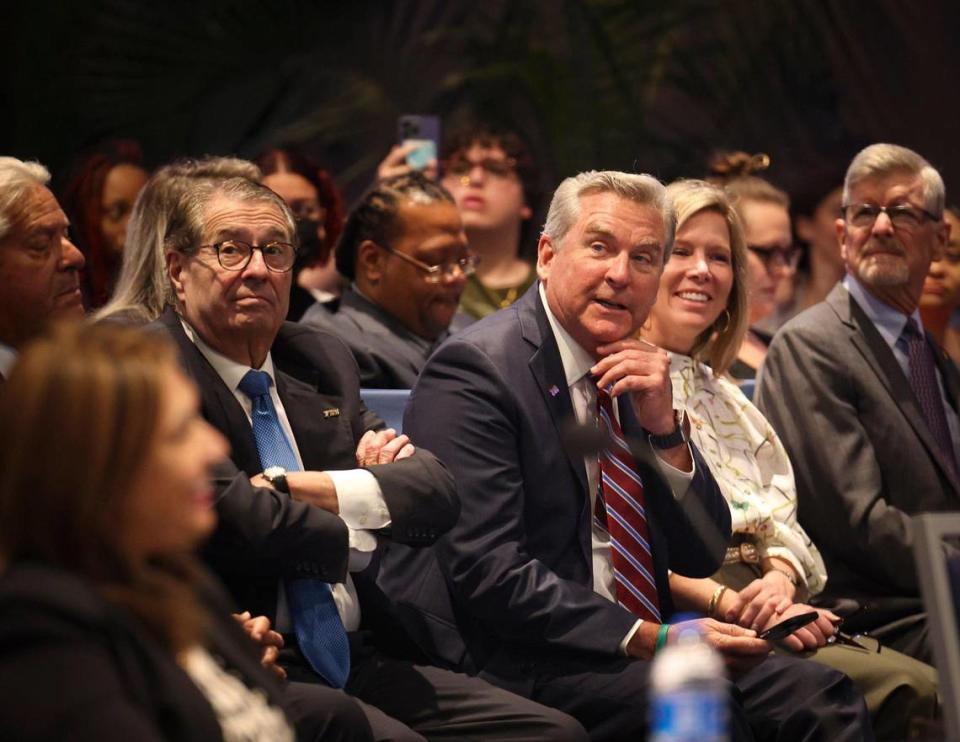Baptist Health, South Florida’s biggest healthcare provider, offers buyouts to cut costs
Baptist Health South Florida, the region’s largest healthcare provider, intends to trim its executive ranks through voluntary buyouts in order to reduce the nonprofit organization’s expenses during a challenging post-pandemic operating climate.
Albert “Bo” Boulenger, Baptist Health’s CEO, revealed to employees in an internal email that the Coral Gables-based company was going to offer company leaders at the director level and above a “one-time opportunity” to apply for voluntary separation.
Baptist Health employs 27,000 people and operates 12 hospitals, 200 outpatient centers, urgent care centers and physician practice offices in Miami-Dade, Broward, Monroe and Palm Beach counties.
Boulenger’s message to employees didn’t reveal any of the key terms of the voluntary separation program, including financial inducements that would be offered to eligible workers, the specific number of employees Baptist Health hopes will depart and when they will start leaving. Also, the CEO’s email didn’t mention the expected cost-cutting financial benefit, meaning the amount of money the company wants to save in salaries and benefits through the buyouts.
“With financial headwinds stemming from rising costs, decreased reimbursement, staffing shortages and other industry factors, we must continue to focus on being a more efficient organization,” Boulenger said in his Wednesday email.
A Baptist Health spokeswoman said Thursday the organization hasn’t yet determined the specific number of employees it hopes will accept a voluntary exit. Decisions on buyout applications will be made during the summer and departure dates will vary, she said.
Boulenger, who was promoted in 2022 from chief operating officer to the top executive post, said in his email message Baptist Health would continue assessing ways to “improve coordination and collaboration” across the organization with a regional management approach to better serve patients.
“While this time of change is difficult, we know that it is necessary to position Baptist Health to be able to continue carrying out our important mission of caring for our communities for many years to come,’’ he said.
Baptist Health generates a little more than $5 billion of revenue annually. On its website, the healthcare company said last year it provided $487.9 million worth of “charity care,” which is free medical care to the uninsured and indigent in the South Florida community.
It appears the last time Baptist Health offered voluntary buyouts to employees was in July 2016, when it employed 11,350 people. Money saved from that round of staff reductions enabled the company to reinvest capital into growth areas such as the Miami Cancer Institute, enhanced technology and an expansion of primary care and outpatient services, a spokesperson told the Miami Herald at the time.
In April of this year, Baptist Health and Florida International University announced they agreed to become medical partners. The partnership will enable Baptist to tap a pipeline of medical students from FIU’s Herbert Wertheim College of Medicine that got its start in 2006. New doctors and other medical professionals will gain clinical training and research experience at Baptist hospitals and health centers.
Baptist and FIU plan to build a clinic on the university’s main campus in West Miami-Dade, and the alliance of the two institutions would help Baptist become a certified teaching hospital, Boulenger said in April.
Teaching hospitals, such as Jackson Memorial Hospital in Miami, work with medical schools and other academic medical programs to train doctors, nurses and other healthcare professionals through residencies, internships, fellowships and post-doctoral programs. There are more than 1,000 U.S. teaching hospitals, according to the American Hospital Association.


